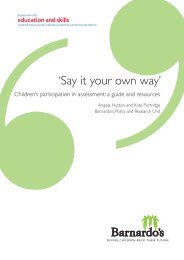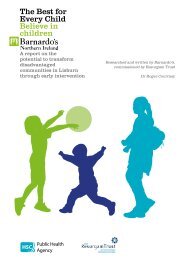Splintered Lives - Barnardo's
Splintered Lives - Barnardo's
Splintered Lives - Barnardo's
You also want an ePaper? Increase the reach of your titles
YUMPU automatically turns print PDFs into web optimized ePapers that Google loves.
PAGE 8<br />
chapter<br />
3<br />
Current international law<br />
and policy<br />
A number of international laws and conventions have been developed in relation to sexual<br />
exploitation and trafficking in children, but the UN Convention on the Rights of the Child<br />
brings these together within an overall framework of children's rights. Signatories to the<br />
convention are obligated to fulfill its recommendations, a number of which refer explicitly to<br />
sexual exploitation. Children's rights experts and advocates argue that the convention needs<br />
to be taken as a whole, and that the combination of provision, protection and participation<br />
needs to be remembered in any policy developments on specific areas. With the above<br />
caveat in mind we reproduce below the articles which refer explicitly to sexual exploitation 5 .<br />
Article 34<br />
States Parties undertake to protect the child from all forms of sexual exploitation<br />
and sexual abuse. For these purposes States Parties shall in particular take<br />
appropriate national, bilateral and multilateral measures to prevent:<br />
a) the inducement or coercion of a child to engage in any unlawful sexual activity;<br />
b) the exploitative use of children in prostitution or other unlawful practices;<br />
c) the exploitative use of children in pornographic performances and materials.<br />
Article 35<br />
States parties shall take appropriate national, bilateral and multilateral measures<br />
to prevent the abduction, the sale of or traffic in children for any purpose or in any<br />
forms.<br />
Article 39<br />
States parties shall take all appropriate measures to promote physical and<br />
psychological recovery and social re-integration of child victims of: any form of<br />
neglect, exploitation, or abuse; torture or any other form of cruel, inhuman or<br />
degrading treatment or punishment; or armed conflicts. Such recovery and reintegration<br />
shall take place in an environment which fosters the health, selfrespect<br />
and dignity of the child.<br />
Each of these three clauses are 'protective' - obliging states to act. But contributors at the<br />
Brussels seminar concurred that few states, or international bodies (one example offered was<br />
limited work by UNICEF) have made sexual exploitation a priority. There is even less<br />
evidence of the three foundations of the Convention - protection, provision (in terms of<br />
material resources and services to children) and participation - informing responses.<br />
Another specifically relevant section is Article 17 A, which discusses information which may<br />
be damaging to children, making children's contact with pornography an issue of concern,<br />
and at the same time flags up the importance of access to information about non-exploitative<br />
sexuality. The Articles which address children's access to justice are also relevant if one of<br />
our concerns is to provide forms of redress.<br />
The European Forum for Child Welfare 1993 discussion paper takes the convention as its<br />
starting point in setting a research and policy development plan (summarised below).<br />
………………………………………………………………………………………………………..<br />
5<br />
A 'special rapporteur' has been appointed to monitor the implementation of the sections of the convention which relate to the<br />
sale of children, child prostitution and child pornography and the appointee makes regular reports to the UN; several of which<br />
have been used in the preparation of this document. Professor Vitit Muntarbhorn resigned from his position in late 1994, citing<br />
personal reasons and lack of support from the UN.
















